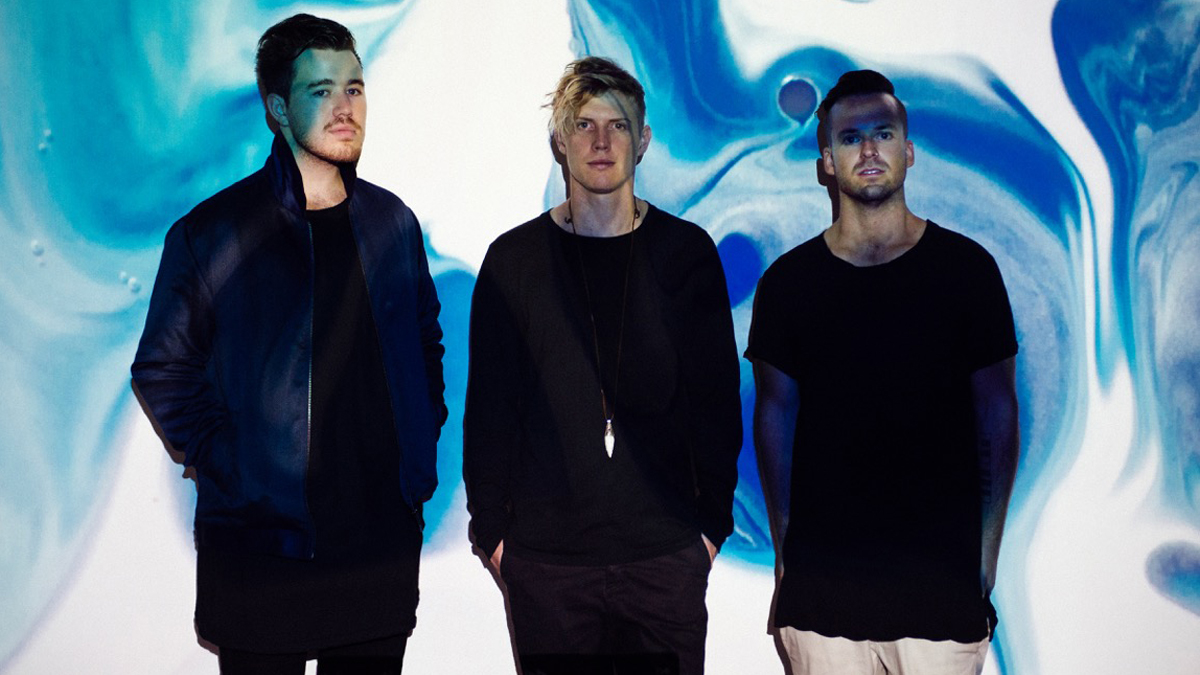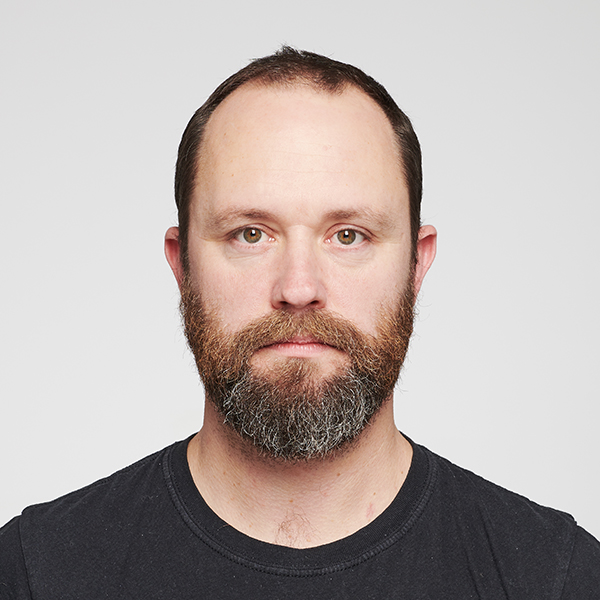Jon George of RÜFÜS talks gear, touring and recording sessions
Australian indie/electro-poppers look to 'Bloom' on sophomore release

When you think of Australian music exports, you probably cast your mind back to INXS, Men at Work or Midnight Oil, but how many electronic bands has this vast continent successfully exported - not many! It's not easy to make waves when you're thousands of miles across the ocean, yet Sydney-based indie-electronic band RÜFÜS hope to change all that.
Consisting of Tyrone Lindqvist (vocals, guitar), Jon George (keyboards) and James Hunt (drums), the trio's debut album, Atlas, stormed to the number one spot in Australia in 2013.Key to the band's success is their DIY aesthetic and an exhausting touring schedule that has enabled them a loyal cult following at home and in North America.
The band is now set to take on the global market with their sophomore release, Bloom. Combining live instruments with electronic production, George explains the process behind the album's creation and how RÜFÜS plan to spread their wings.
How did you get together as trio?
"Tyrone was best friends with my little brother, so I saw him around the house a bit, and James, our drummer, went to the same school. We were making music separately, doing a bunch of Folk and acoustic stuff, but I was also doing an audio engineering degree.
"We came to the realisation that we liked similar artists, people like Trentemøller, Booka Shade and Royksopp. When we got in the studio everything worked really well together. We've always been rooted in combining organic sounds and textures with the electronic world. At least that's where we found ourselves, bringing our ideas to life using electronic music."
I presume you took that audio engineering course with a view to working in the industry?
Get the MusicRadar Newsletter
Want all the hottest music and gear news, reviews, deals, features and more, direct to your inbox? Sign up here.
"I got into DJing when I left school, bought some decks and started practising. About a year later I was playing out in clubs and I felt the next progression would be to make music. I knew I wanted to work in the industry in some way, so as soon as I finished the degree the band started and it hasn't stopped.
"The degree helped me massively; we can set up a studio anywhere. Recording a Gospel choir - as we did on a few tracks on Bloom - or micing up a drum kit is not really a hassle; we don't need to hire anyone. I've taught the guys everything I know and we're all on a similar level now as producers."
Your debut album went straight to number one in Australia. Does that put pressure on you to repeat the success with Bloom?
"We've been getting this question quite a bit lately, but to be honest it hasn't been like that at all - not in my head at least. We've been touring for two years on the back of Atlas and were just super-excited to get back in the studio and write.
"Once we were back in that rhythm it never sounded like we were deviating. Just putting our own spin on the music makes the sound what it is, so it's really not been difficult to stay on track."
"We work really hard on mixing and defining different sounds in a track, but having someone else be able to meticulously go through the same thought patterns, especially with the vocals where we maybe still have a lot to learn, is important."
Do you tend to jam in the studio and build your tracks up that way?
"Yeah, that's right. In the studio anyone can play any part in the song composition. We usually start every track by mucking around with keys, using hardware synths or soft synths through Ableton. Trying to map out a feeling is probably the first thing we'll do, and anyone can take that lead.
"We started the album process while we were doing festivals, turning various places into a studio for a week, but Berlin is probably where we wrote the foundations of the tracks that are now on the album. Then we finished everything off over several months here in Australia, renting a space in Sydney - and touring here or there to break things up a bit."
What tools do you use in the studio?
"The studio itself has a couple of rooms, so we can have a separate vocal booth or do drum tracking. For this album we wanted to try and push ourselves and record out of the box whenever we could, using hardware synths.
"We have a playback rack that we use on stage and everything's always plugged in, so it's never too much of a hassle if you feel like doing something intuitive."
What hardware synths have you been using?
"We have a Dave Smith Mopho - the x4 with the four oscillators - and we bought some Nord Electro 5Ds recently, which have been awesome. We also have a Korg MS-20 Mini, which is sick, a Jupiter 8 and a TB-3 and VT-3 - the new Roland AIRA products."
Do you prefer using the hardware version of the Jupiter to the software emulation?
"Ableton is how we got into our love for using Jupiter and Prophet synths, because we'd been using the emulators for a while now. I think they're pretty awesome and I'm hard pressed to be able to tell the difference sometimes, even though there's something really unique and genuine about the hardware synths.
"We're really enjoying discovering those warm analogue sounds for ourselves - if one of the knobs has some dust in it, it gives the sound some authentic crackle."
What soft synths do you like to complement your sound with?
"We started using Native Instruments' Komplete a while ago, and we use Battery pretty heavily for all the drum sequencing. I love the amount of control you can have in humanising each sound and being able to pull your own samples into it."
The production sounds very slick, is it crafted with the same care and attention or perfected in the mixing and mastering stage?
"We prefer to mix as we go, particularly as it suits the way that we're writing. Even though we do that, we've had the whole album mixed by a friend of ours in Sydney. We actually got the first track mixed by a number of people, then got the album mastered in the UK. I think having those extra opinions coming in is huge, and we don't have a big ego about it because they do boost the album by an extra ten per cent.
"We work really hard on mixing and defining different sounds in a track, but having someone else be able to meticulously go through the same thought patterns, especially with the vocals where we maybe still have a lot to learn, is important. Particularly the mastering; I was blown away by how they can change vocal parts without touching any of the other frequencies around it."
"I got into DJing when I left school, bought some decks and started practising. About a year later I was playing out in clubs and I felt the next progression would be to make music. I knew I wanted to work in the industry in some way, so as soon as I finished the degree the band started and it hasn't stopped."
What technology do you use on stage?
"We use Ableton running MIDI lines to the MS-20 and TB-3 on stage. Other than that, we have the two Nords that Tyrone and I use, so we can sample anything that we've used on a track, put it into the keyboard and change it to a nice piano or organ sound. We've tried to be less reliant on digital technology than in the past.
"We relied on Ableton much more heavily live, so it's much more out of the box in the way we translate the music now. We're coming to Europe in March and want to play most of the album, so we're just about to try and work out who's going to play what, which is always a fun part of things."
Coming from Australia, have you found it difficult to translate that success to Europe or America?
"I think that in breaking down those barriers the internet has obviously been a huge help. But we've been in America more often than we have Europe, building our fan base there and going back to play and share new music with them. With the way that it's grown there, it certainly seems to be one of our main markets.
"Now that we're back in Europe for a while, we'll try and be as present there as we have been in Australia. I can see us relocating for sure, because Australia is so far away - it's really taxing trying to keep a healthy lifestyle going when you're coming back after a 14 or 20-hour flight."
I understand you were frustrated at having to change your name to RÜFÜS DU SOL in North America?
"Yeah, I guess it's a bit boring [laughs] but the name RÜFÜS seemed like a pretty familiar name to us and the accents sort of gave it a foreign, other-worldly feel. Basically, we had to change our name in the US when we signed with Columbia because of a copyright issue with Chaka Khan's first band. We thought that DU SOL keeps that foreign feel; it sounds like an island in the middle of nowhere."
The new RÜFÜS album 'Bloom' is released 22 January on Columbia Records. For more information, check out their Facebook, Twitter, and SoundCloud pages.



I take care of the reviews on MusicRadar and Future Music magazine, though can sometimes be spotted in front of a camera talking little sense in the presence of real musicians. For the past 30 years, I have been unable to decide on which instrument to master, so haven't bothered. Currently, a lover of all things high-gain in the guitar stakes and never one to resist churning out sub-standard funky breaks, the likes of which you'll never hear.









